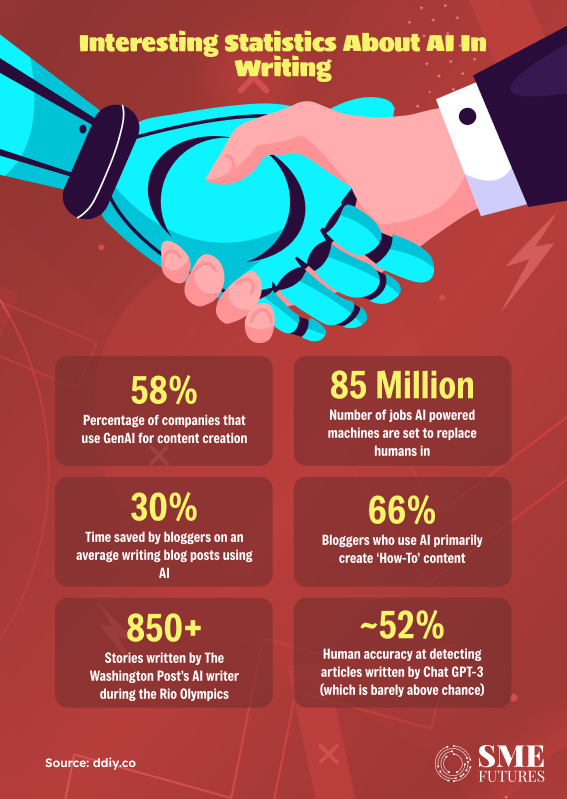The use of artificial intelligence to create content, interesting! Isn’t it? However, it is not just about technological advancement, but also about the challenges that content creators are facing. Until the internet was not all pervasive, nobody would have thought that almost every business would be digitalised one day. Also, the widespread use of smartphones has led to the meteoric rise of social media, and it’s extensive adoption by the masses.
The job of a content writer was almost unheard of in the early 2000s but when it all started to gain ground in the latter part of the decade, even the topmost business players claimed that content was the future and content writers were the future-shapers. As per an article on generative AI written by David De Cremer, Nicola Morini Bianzino and Ben Falk, published by the Harvard Business Review in 2023, the creator economy is valued up to $14 billion annually.
However, the twist in the story came when artificial intelligence (AI) systems began to gain ground. Nowadays, if you wish to write an article or a story, you can just make use of platforms like ChatGPT, Gemini or Perplexity. On some AI platforms, one can even get the links to the sources of all the information that they carry. Every other organisation is busy developing their own AI platform. Facilities are available not only for writing but also for paraphrasing, summarising, etc. This can either lead to content writers losing their jobs or getting paid less.

Originality always sustains
Of course, for creativity, originality and a distinct approach, a writer is needed; but for generic or informative topics, AI systems are facilitating many small businesses. To know the perspective of someone who runs a business that once completely depended on content writers, we contacted Parthiv Ballu, SEO Manager in a self-owned company based in Ahmedabad.
He says, “AI is revolutionising the writing industry and it’s just the beginning. As an SEO manager, I’ve seen how this technology enhances my efficiency and research capabilities. By embracing AI, I can create high-quality content faster and more effectively, transforming the way I work and allowing me to focus on what truly matters: delivering value to my audience.”
It is abundantly clear that business owners are benefitting from AI and are hopeful about its future. The only concern is that when AI will do everything, what will the real writers do!? There is a very real fear of losing jobs but conversely, it is has become increasingly evident that in this scenario, only outstanding writers, most probably book writers, are going to shine.
The current phase is still a relaxed one as businesses are training their AI platforms with the help of writers’ inputs because to make AI systems perfect, a lot of accurate information and writing techniques need to be fed into the system. And there lies the answer! These writers, who are needed to train the systems, are effectively carving out new careers for themselves and for others like them. Writing jobs might be declining, but editing jobs are still a plenty. Editing the content provided by AI systems has practically become an industry in itself.
An article by the World Economic Forum published in 2023 says that artificial intelligence language learning models (LLMs) will impact around 44 per cent of all working hours. It also states that while increased productivity and efficiency will be there, many clerical or secretarial roles might decline. It also says that reskilling professionals with AI could be a solution to such job problems.
Different people see this advancement with different perspectives.
According to Deepak Goel, Editor and Founder at RealtynInfra.co.in, “AI is certainly causing some job losses in the content writing field and it is a matter of concern. It’s also a wake-up call for content writers to learn new skills associated with content writing and become multi-taskers so that they become indispensable for their employers and even earn more than what they have been earning so far.” As an experienced writer, editor and business owner himself, Goel seems hopeful and welcoming towards AI platforms.
Change is the only constant
What is happening right now is similar to the replacement of paperwork with desktop computers and then laptops and palmtops. The transition was a rough phase for many people but eventually it brought more jobs and benefits. Another comparison could be made with digitalisation that has now minimised cash payments and online payments have become the norm. This caused a lot of difficulty for traditional people initially but has since been adopted on a massive scale by the masses. Eventually, once the transition phase is over, it only leads to progress.
Regarding the impact of AI on content jobs, we spoke to Swapna Abraham who is India Country Chair, G100 Media Arts & Communication and a member of the Governing Council/Academic Advisory Board.
She says “While much is to be said about AI, there is no doubt that it has most impacted creativity. No one needs to think up content ideas, or the lines that fill in such ideas anymore. This works well for routine communication-business or otherwise. But it is a spoiler for authentic writing, even original research. I hope that those that are in the space of creative writing will put on their imaginative caps and write for real.”
All in all, people and businesses are ready for change and willing to adopt artificial intelligence platforms. To survive in the long run, content writers will have to keep updating themselves in accordance with the swiftly advancing technologies. An emerging technology might bring challenges, but it has certain limitations as well, which could provide a new space for real writers. And for sure, it will bring progress to businesses, thereby creating a new niche for start-ups and medium enterprises.











